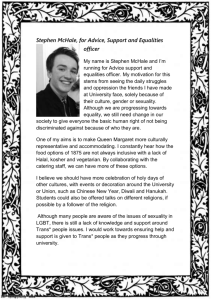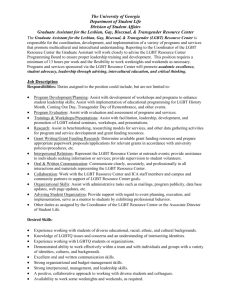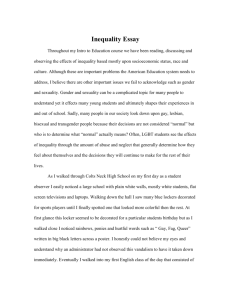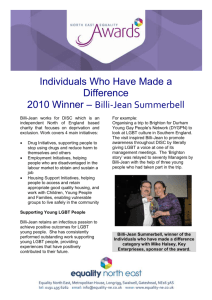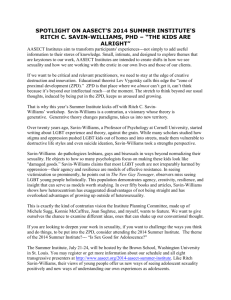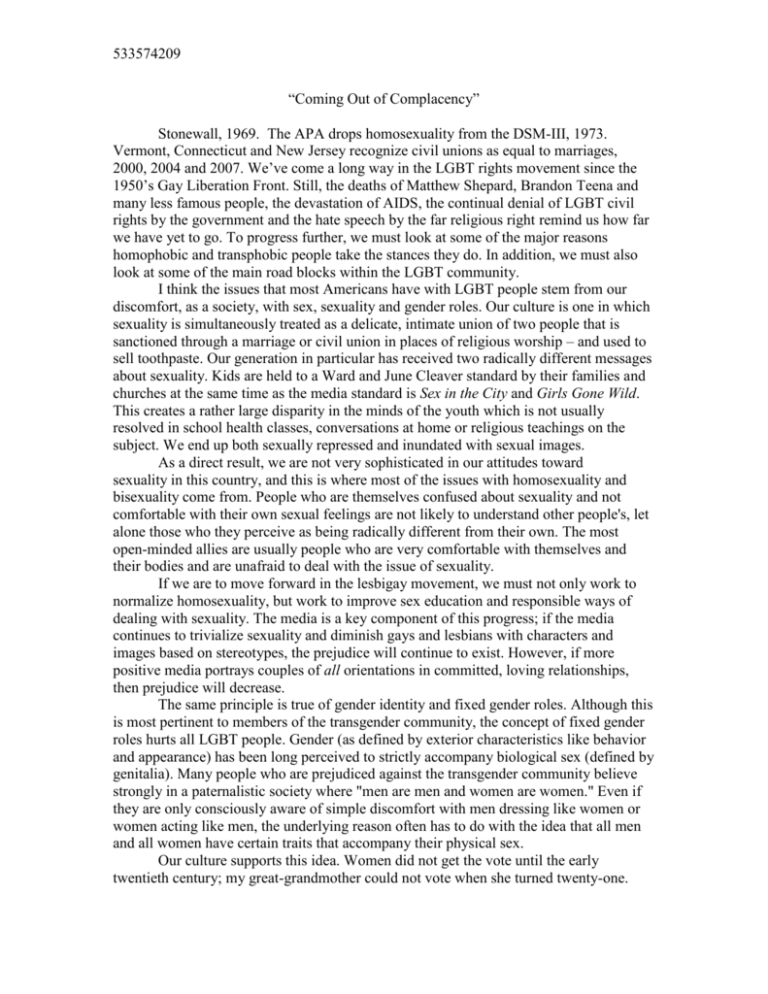
533574209
“Coming Out of Complacency”
Stonewall, 1969. The APA drops homosexuality from the DSM-III, 1973.
Vermont, Connecticut and New Jersey recognize civil unions as equal to marriages,
2000, 2004 and 2007. We’ve come a long way in the LGBT rights movement since the
1950’s Gay Liberation Front. Still, the deaths of Matthew Shepard, Brandon Teena and
many less famous people, the devastation of AIDS, the continual denial of LGBT civil
rights by the government and the hate speech by the far religious right remind us how far
we have yet to go. To progress further, we must look at some of the major reasons
homophobic and transphobic people take the stances they do. In addition, we must also
look at some of the main road blocks within the LGBT community.
I think the issues that most Americans have with LGBT people stem from our
discomfort, as a society, with sex, sexuality and gender roles. Our culture is one in which
sexuality is simultaneously treated as a delicate, intimate union of two people that is
sanctioned through a marriage or civil union in places of religious worship – and used to
sell toothpaste. Our generation in particular has received two radically different messages
about sexuality. Kids are held to a Ward and June Cleaver standard by their families and
churches at the same time as the media standard is Sex in the City and Girls Gone Wild.
This creates a rather large disparity in the minds of the youth which is not usually
resolved in school health classes, conversations at home or religious teachings on the
subject. We end up both sexually repressed and inundated with sexual images.
As a direct result, we are not very sophisticated in our attitudes toward
sexuality in this country, and this is where most of the issues with homosexuality and
bisexuality come from. People who are themselves confused about sexuality and not
comfortable with their own sexual feelings are not likely to understand other people's, let
alone those who they perceive as being radically different from their own. The most
open-minded allies are usually people who are very comfortable with themselves and
their bodies and are unafraid to deal with the issue of sexuality.
If we are to move forward in the lesbigay movement, we must not only work to
normalize homosexuality, but work to improve sex education and responsible ways of
dealing with sexuality. The media is a key component of this progress; if the media
continues to trivialize sexuality and diminish gays and lesbians with characters and
images based on stereotypes, the prejudice will continue to exist. However, if more
positive media portrays couples of all orientations in committed, loving relationships,
then prejudice will decrease.
The same principle is true of gender identity and fixed gender roles. Although this
is most pertinent to members of the transgender community, the concept of fixed gender
roles hurts all LGBT people. Gender (as defined by exterior characteristics like behavior
and appearance) has been long perceived to strictly accompany biological sex (defined by
genitalia). Many people who are prejudiced against the transgender community believe
strongly in a paternalistic society where "men are men and women are women." Even if
they are only consciously aware of simple discomfort with men dressing like women or
women acting like men, the underlying reason often has to do with the idea that all men
and all women have certain traits that accompany their physical sex.
Our culture supports this idea. Women did not get the vote until the early
twentieth century; my great-grandmother could not vote when she turned twenty-one.
533574209
Even today, women are paid less in the same occupations as men and stay-at-home
fathers are looked down upon by their working male peers. These long-standing social
biases stand in the way of accepting people who bend the gender rules and especially
those who wish to become the opposite sex. If the transgender (and lesbigay)
communities are to move forward, we must work to further equalize the sexes. If there is
no distinguishable difference in rights and expected social roles, then people who do not
fit into their sex's gender will face many fewer problems.
Though these are major sociopolitical issues that loom in the faces of those who
would effect change, problems within the LGBT community are just as pertinent.
Because we are a hot-seat minority right now, every action any of our members take is
under direct public scrutiny. Every out LGBT person that does drugs, drinks, or has
promiscuous sex sets the movement back; at the same time, social pressures often drive
LGBT people to lose themselves in drugs, alcohol and promiscuous sex more than their
heterosexual peers. Many of those against LGBT rights use this problem to attack us on a
moral basis; therefore, we need leaders and advocates who are as morally upstanding as
their critics. This will help us present ourselves well and give LGBT youth positive role
models.
Equally important, we must seek to eliminate factioning in the community.
Because the only thing many LGBT people have in common is their sexual orientation or
gender identity, we have a proportional amount of diversity. While diversity of opinion is
wonderful and necessary for progress, we must also consider trying to fight a much more
unified battle. The reason conservativism has risen so sharply in recent years is because
the social conservatives, the fiscal conservatives, the religious conservatives and the
libertarians all united under a common flag and compromised certain initiatives to work
together. They didn't always agree, but they always worked it out somehow before going
public. Liberals have comparatively fallen behind because of the sheer diversity of
opinion and focus, and the same is true of the LGBT community. If all the major LGBT
groups would work together and work with major feminist, racial equity and scientific
advancement groups, the movement would gain momentum much more quickly.
In the end, we must view the issue from all angles, both social and political, and
consider things we can do within and outside the LGBT community. The actions we take
today will directly affect the reactions of society tomorrow.

